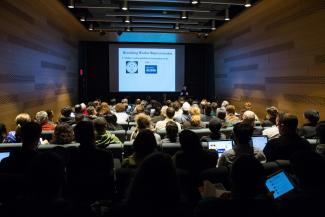
Agaric hosts a weekly online gathering known as Show and Tell. Participants share tips and tricks we have learned and pose questions to other developers on tasks or projects we are working on. Each week we ask people to send us a little info on what they would like to present. This is not a prerequisite, just a suggestion. Having advance notice of presentations allows us to get the word out to others that may be interested, but you can just show up, and there will most likely be time to present for 5-10 minutes. Sign onto the Show and Tell mailing list and be notified of upcoming Show and Tell events.
Recently we have opened up the Show and Tell chat to bond with other cooperatives that do web development work. Agaric was contacted by members of Fiqus.coop in Argentina as they had started an initiative to meet other cooperative developers and share values and goals. No one had sent notice of a presentation, so we switched the topic of the chat to be more of a meet and greet to get to know each other better with the goal in mind to be able to share our work on projects. The value of the meeting was immediately apparent as we delved into conversation with a few members of Fiqus.
Next, we invited more developers to take part in the discussion, and the doors were opened to share more deeply and connect. This week our meeting was over the top! Nicolas Dimarco led us through a short presentation of slides that revealed a Federated process and workflow to share development with members of multiple cooperatives. The plan is so simple that everyone immediately understood and the conversation that ensued was compelling, and the questions were indicative of where we need to educate each other about cooperative principles vs. corporate tactics. We need more discussion on trust and friendship. There are so many developers in corporate jobs that have asked me how a web development cooperative works and how does a project run without a manager. I first explain that projects do have managers, but they are managing the work, not the people. Taking time to get to know each other's skills and passions about programming is a core part of being able to work together in a Federation. Fiqus.coop has made it plain and simple for all to see the path to sharing work on projects!
Here is a link to the video recording of the chat where Nicolas Dimarco of Fiqus.coop presents the formula for federated work among cooperatives. Here is a link to the notes from the meeting on 3/20/2019 and some past Show and Tell meetings.
More information on Show and Tell.
Some Drupal shops already work together on projects and we can help that grow by sharing our experiences. We would love to hear about the ways you work and the processes you have discovered that make sharing work on projects a success!
Notes
Slides - https://github.com/fiqus/FIT-talk-en
## FACTTIC - Argentinian Federation of Tech Cooperatives
* Members-only mailing list
* Mattermost (open-source chat)
* Monthly virtual board meeting (any member can attend)
* Annual face to face meetings
## FIT
* A project within FACTTIC where coops share the status of projects they are working on
* Evolved to an area where coops share projects
* To join FIT, you need to be a FACTTIC member
* Monthly virtual meetings
* Mattermost channel for ongoing dialog
* Coops have different skills/services, but when there is overlap, try not to compete with one another and determine the 'needs' of each coop.
### Scenario 1: Project demands more workers than coop has
* When there is a need for help, project is shared in FIT
* Coops can apply to join the project
* Candidates are evaluated and one is chosen
* Client is told and must agree
* Project coordination is led by initial coop
* Commercial agreement is handled only by initial coop
### Scenario 2: Client needs work done, but coop decides not take it
* This might happen because initial coop doesn't have the resources or declines for a strategic reason
* Project is shared with FIT
* If no coops are interested, the client is told no one is available.
* If one coop is interested, that coop's contact is shared with the client.
* If more than one coop is interested, then we ask, does this project require more than one worker?
* If it only needs one worker, then the coop who needs it most receives it
* If it requires more than one worker, then the coops coordinate with one another to complete the work.
## Case Studies
### Betterez
* Canadian client
* Reservations and Ticketing Management Platform
* Technologies: MongoDB, NodeJS, VueJS and Elixir
* Needed more work than Fiqus could provide
* 30 developers with 7 different coops
* Fiqus manages financial questions such as the different rates for different services
### Receptivi
* Canadian client
* Website shows real-time psychological insights of staff
* Had more work, but Fiqus declined to take on the work
* Work was shared in FIT
* 3 developers from 2 coops
### Mall Plaza
* Chilean client
* Mobile app showing mall services
* Tech: React Native, PostgreSQL, Flask
## Onapsis
* Argentinian client
* Web system showing vulnerability alerts on servers
* 2 coops
## International FIT
* Ww want to replicate this model on an international level
1. Share this model with others in order to improve it and spread awareness
* Presenting at Show and Tell
2. Build trusted relationships
3. Get to know each other in person, spend time together
* Traveling to the UK, meeting with the federation, COTECH
* Share experiences after trip
## Questions and Answers:
Q: Have you ever had resistance from a client when handing off work to another coop?
A: There are times when clients don not understand coops and cooperation among coops. We explain the benefit and share case studies. If there is a deadline that needs to be met, it is faster to bring a team on with prior experience working with the original company than trying to find a completely different company.
Q: How much do you share about multiple coops working on a project?
A: If it's only a few hours, it's not worth talking about. However, most of the time it's important to share that information and use it as an educational opportunity to demonstrate the strength of coops working together.
* Once clients see the outcome of cooperation they realize it is a good way to approach work.
* The simplicity of the process is beautiful.
Q: How do you share business development costs?
A: The coop sharing the project might lower their rates during the ramp up process.
* This is an aspect that could be improved.
* The most important thing is to be transparent and communicate a lot.
* Keep the spirit of generosity flowing.
* When the cooperation is successful, it builds trust with the client.
* Use a tool to analyze project budgets and progress and forecast availability.
* Cooperation also ensures quality, trusted workers will join the project.






Comments
Add new comment